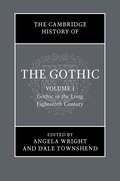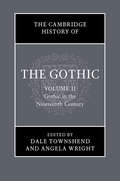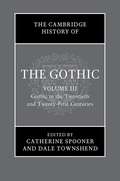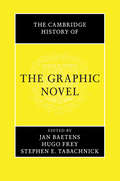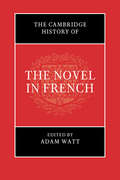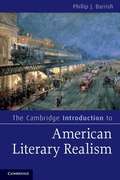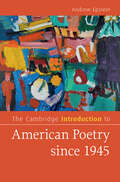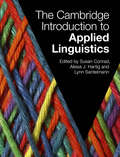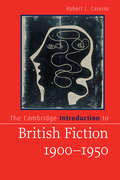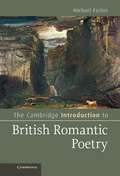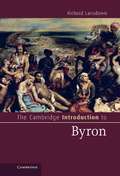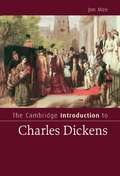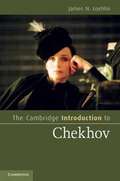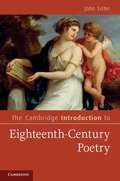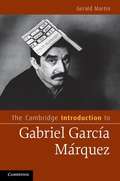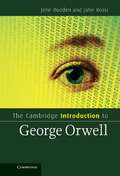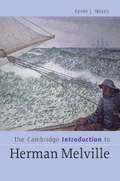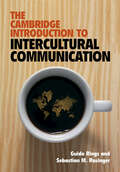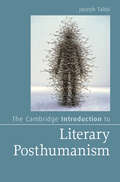- Table View
- List View
The Cambridge History of the Gothic: Volume 1: Gothic in the Long Eighteenth Century (The Cambridge History of the Gothic)
by Angela Wright Dale TownshendThis first volume of The Cambridge History of the Gothic provides a rigorous account of the Gothic in Western civilisation, from the Goths' sacking of Rome in 410 AD through to its manifestations in British and European culture of the long eighteenth century. Written by international cast of leading scholars, the chapters explore the interdisciplinary nature of the Gothic in the fields of history, literature, architecture and fine art. As much a cultural history of Gothic as an account of the ways in which the Gothic has participated within a number of formative historical events across time, the volume offers fresh perspectives on familiar themes while also drawing new critical attention to a range of hitherto overlooked concerns. From writers such as Horace Walpole and Ann Radcliffe to eighteenth-century politics and theatre, the volume provides a thorough and engaging overview of early Gothic culture in Britain and beyond.
The Cambridge History of the Gothic: Volume 2, Gothic in the Nineteenth Century (The Cambridge History of the Gothic)
by Angela Wright Dale TownshendThis second volume of The Cambridge History of the Gothic provides a rigorous account of the Gothic in British, American and Continental European culture, from the Romantic period through to the Victorian fin de siècle. Here, leading scholars in the fields of literature, theatre, architecture and the history of science and popular entertainment explore the Gothic in its numerous interdisciplinary forms and guises, as well as across a range of different international contexts. As much a cultural history of the Gothic in this period as an account of the ways in which the Gothic mode has participated in the formative historical events of modernity, the volume offers fresh perspectives on familiar themes while also drawing new critical attention to a range of hitherto overlooked concerns. From Romanticism, to Penny Bloods, Dickens and even the railway system, the volume provides a compelling and comprehensive study of nineteenth-century Gothic culture.
The Cambridge History of the Gothic: Volume 3: Gothic in the Twentieth and Twenty-First Centuries (The Cambridge History of the Gothic)
by Dale Townshend Catherine SpoonerThe third volume of The Cambridge History of the Gothic is the first book to provide an in-depth history of Gothic literature, film, television and culture in the twentieth and twenty-first centuries (c. 1896-present). Identifying key historical shifts from the birth of film to the threat of apocalypse, leading international scholars offer comprehensive coverage of the ideas, events, movements and contexts that shaped the Gothic as it entered a dynamic period of diversification across all forms of media. Twenty-three chapters plus an extended introduction provide in-depth accounts of topics including Modernism, war, postcolonialism, psychoanalysis, counterculture, feminism, AIDS, neo-liberalism, globalisation, multiculturalism, the war on terror and environmental crisis. Provocative and cutting edge, this will be an essential reference volume for anyone studying modern and contemporary Gothic culture.
The Cambridge History of the Graphic Novel
by Stephen E. Tabachnick Jan Baetens Hugo FreyThe Cambridge History of the Graphic Novel provides the complete history of the graphic novel from its origins in the nineteenth century to its rise and startling success in the twentieth and twenty-first century. It includes original discussion on the current state of the graphic novel and analyzes how American, European, Middle Eastern, and Japanese renditions have shaped the field. Thirty-five leading scholars and historians unpack both forgotten trajectories as well as the famous key episodes, and explain how comics transitioned from being marketed as children's entertainment. Essays address the masters of the form, including Art Spiegelman, Alan Moore, and Marjane Satrapi, and reflect on their publishing history as well as their social and political effects. This ambitious history offers an extensive, detailed and expansive scholarly account of the graphic novel, and will be a key resource for scholars and students.
The Cambridge History of the Novel in French
by Adam WattThis History is the first in a century to trace the development and impact of the novel in French from its beginnings to the present. Leading specialists explore how novelists writing in French have responded to the diverse personal, economic, socio-political, cultural-artistic and environmental factors that shaped their worlds. From the novel's medieval precursors to the impact of the internet, the History provides fresh accounts of canonical and lesser-known authors, offering a global perspective beyond the national borders of 'the Hexagon' to explore France's colonial past and its legacies. Accessible chapters range widely, including the French novel in Sub-Saharan Africa, data analysis of the novel system in the seventeenth century, social critique in women's writing, Sade's banned works and more. Highlighting continuities and divergence between and within different periods, this lively volume offers routes through a diverse literary landscape while encouraging comparison and connection-making between writers, works and historical periods.
The Cambridge Introduction to American Literary Realism
by Phillip J. BarrishBetween the Civil War and the First World War, realism was the most prominent form of American fiction. Realist writers of the period include some of America's greatest, such as Henry James, Edith Wharton and Mark Twain, but also many lesser-known writers whose work still speaks to us today, for instance Charles Chesnutt, Zitkala-Ša and Sarah Orne Jewett. Emphasizing realism's historical context, this introduction traces the genre's relationship with powerful, often violent, social conflicts involving race, gender, class and national origin. It also examines how the realist style was created; the necessarily ambiguous relationship between realism produced on the page and reality outside the book; and the different, often contradictory, forms 'realism' took in literary works by different authors. The most accessible yet sophisticated account of American literary realism currently available, this volume will be of great value to students, teachers and readers of the American novel.
The Cambridge Introduction to American Poetry since 1945 (Cambridge Introductions to Literature)
by Andrew EpsteinContemporary American poetry can often seem intimidating and daunting in its variety and complexity. This engaging and accessible book provides the first comprehensive introduction to the rich body of American poetry that has flourished since 1945 and offers a useful map to its current landscape. By exploring the major poets, movements, and landmark poems at the heart of this era, this book presents a compelling new version of the history of American poetry that takes into account its variety and breadth, its recent evolution in the new millennium, its ever-increasing diversity, and its ongoing engagement with politics and culture. Combining illuminating close readings of a wide range of representative poems with detailed discussion of historical, political, and aesthetic contexts, this book examines how poets have tirelessly invented new forms and styles to respond to the complex realities of American life and culture.
The Cambridge Introduction to Applied Linguistics
by Susan Conrad Lynn Santelmann Alissa J. HartigWritten by a global team, this up-to-date introduction to applied linguistics helps students learn what it's like to do applied linguistics, and not just read about theoretical concepts. First, it provides frameworks for understanding both the shared characteristics of work in applied linguistics and the diversity of topics and analyses. Each chapter then highlights a topic area, covering key concepts, a specific project undertaken by the authors, and their personal reflections on entering the field. Hands-on analysis and other application activities also encourage students to test different skills related to each chapter. Finally, students are introduced to the tools they need to continue in applied linguistics: how to read and write empirical research, how to evaluate primary literature, and starting points for expanding their interest in specific subject areas. The authors provide examples from different geographical regions and languages to engage an international audience. At the same time, multilingualism, interdisciplinarity, and technology are integrated as themes within the text to reflect how these areas are now interwoven throughout applied linguistics.
The Cambridge Introduction to British Fiction, 1900–1950 (Cambridge Introductions to Literature)
by Robert L. CaserioExamining the work of more than one hundred writers, in a wide variety of genres including detective, spy, gothic, fantasy, comic, and science fiction, this book is an unusually comprehensive introduction to the novels and short stories of the period. Providing fresh readings of famous modernist figures (Conrad, Ford Madox Ford, Joyce, Woolf, Forster, Lawrence, and others), Robert L. Caserio also brings new attention to lesser-known writers who merit increased attention. He provides readers with an overview of modernist fiction's intellectual milieu, and addresses its contextualization by history and politics - feminism, global war, and the emergence of the welfare state after World War II. An ideal introduction for the student, this book offers a thought-provoking re-examination of literary history, and an exploration of the unique value of fiction's portrayals of the world.
The Cambridge Introduction to British Romantic Poetry
by Michael FerberThe best way to learn about Romantic poetry is to plunge in and read a few Romantic poems. This book guides the new reader through this experience, focusing on canonical authors – Wordsworth, Coleridge, Byron, Keats, Blake and Shelley – whilst also including less familiar figures as well. Each chapter explains the history and development of a genre or sets out an important context for the poetry, with a wealth of practical examples. Michael Ferber emphasizes connections between poets as they responded to each other and to great literary, social and historical changes around them. A unique appendix resolves most difficulties new readers of works from this period might face: unfamiliar words, unusual word order, the subjunctive mood and meter. This enjoyable and stimulating book is an ideal introduction to some of the most powerful and pleasing poems in the English language, written in one of the greatest periods in English poetry.
The Cambridge Introduction to Byron
by Richard LansdownAuthor of the most influential long poem of its era (Childe Harold's Pilgrimage) and the funniest long poem in European literature (Don Juan), Lord Byron was also the literary superstar of Romanticism, whose effect on nineteenth-century writers, artists, musicians and politicians – but also everyday readers – was second to none. His poems seduced and scandalized readers, and his life and legend were correspondingly magnetic, given added force by his early death in the Greek War of Independence. This introduction compresses his extraordinary life to manageable proportions and gives readers a firm set of contexts in the politics, warfare, and Romantic ideology of Byron's era. It offers a guide to the main themes in his wide-ranging oeuvre, from the early poems that made him famous (and infamous) overnight, to his narrative tales, dramas and the comic epic left incomplete at his death.
The Cambridge Introduction to Charles Dickens
by Jon MeeCharles Dickens became immensely popular early on in his career as a novelist, and his appeal continues to grow with new editions prompted by recent television and film adaptations, as well as large numbers of students studying the Victorian novel. This lively and accessible introduction to Dickens focuses on the extraordinary diversity of his writing. Jon Mee discusses Dickens's novels, journalism and public performances, the historical contexts and his influence on other writers. In the process, five major themes emerge: Dickens the entertainer; Dickens and language; Dickens and London; Dickens, gender, and domesticity; and the question of adaptation, including Dickens's adaptations of his own work. These interrelated concerns allow readers to start making their own new connections between his famous and less widely read works and to appreciate fully the sheer imaginative richness of his writing, which particularly evokes the dizzying expansion of nineteenth-century London.
The Cambridge Introduction to Chaucer
by Alastair MinnisGeoffrey Chaucer is the best-known and most widely read of all medieval British writers, famous for his scurrilous humour and biting satire against the vices and absurdities of his age. Yet he was also a poet of passionate love, sensitive to issues of gender and sexual difference, fascinated by the ideological differences between the pagan past and the Christian present, and a man of science, knowledgeable in astronomy, astrology and alchemy. This concise book is an ideal starting point for study of all his major poems, particularly The Canterbury Tales, to which two chapters are devoted. It offers close readings of individual texts, presenting various possibilities for interpretation, and includes discussion of Chaucer's life, career, historical context and literary influences. An account of the various ways in which he has been understood over the centuries leads into an up-to-date, annotated guide to further reading.
The Cambridge Introduction to Chekhov
by James N. Loehlin"Chekhov is widely acknowledged as one of the most influential literary figures of modern times. Russia's preeminent playwright, he played a significant role in revolutionizing the modern theatre. His impact on prose fiction writing is incalculable: he helped define the modern short story. Beginning with an engaging account of Chekhov's life and cultural context in nineteenth-century Russia, this book introduces the reader to this fascinating and complex personality. Unlike much criticism of Chekhov, it includes detailed discussions of both his fiction and his plays. The Introduction traces his concise, impressionistic prose style from early comic sketches to mature works such as 'Ward No. 6' and 'In the Ravine'. Examining Chekhov's development as a dramatist, the book considers his one-act vaudevilles and early works, while providing a detailed, act-by-act analysis of the masterpieces on which his reputation rests: The Seagull, Uncle Vanya, Three Sisters and The Cherry Orchard"--"Anton Chekhov's life has exerted nearly as much fascination as his works. Not only was he a major literary figure with an unquantifiable impact on the drama and fiction of the modern period, but he was an indisputably good man, who worked heroically, throughout his short life, for the benefit of other people. Listing him on a roll call of "modern saints," Chekhov scholar Charles Meister has asserted that "Even if he had not been a great writer, Chekhov would have deserved worldwide recognition for his role as a humanitarian"--
The Cambridge Introduction to Creative Writing
by David MorleyThis pioneering book introduces students to the practice and art of creative writing and creative reading. It offers a fresh, distinctive and beautifully written synthesis of the discipline. David Morley discusses where creative writing comes from, the various forms and camouflages it has taken, and why we teach and learn the arts of fiction, poetry and creative nonfiction. He looks at creative writing in performance; as public art, as visual art, as e-literature and as an act of community. As a leading poet, critic and award-winning teacher of the subject, Morley finds new engagements for creative writing in the creative academy and within science. Accessible, entertaining and groundbreaking, The Cambridge Introduction to Creative Writing is not only a useful textbook for students and teachers of writing, but also an inspiring read in its own right. Aspiring authors and teachers of writing will find much to discover and enjoy.
The Cambridge Introduction to Edward Said
by Conor MccarthyUnlike most existing textbooks on the economic history of modern Europe, which offer a country-by-country approach, The Cambridge Economic History of Modern Europe rethinks Europe's economic history since 1700 as unified and pan-European, with the material organised by topic rather than by country. This first volume is centred on the transition to modern economic growth, which first occurred in Britain before spreading to other parts of western Europe by 1870. Each chapter is written by an international team of authors who cover the three major regions of northern Europe, southern Europe, and central and eastern Europe. The volume covers the major themes of modern economic history, including trade; urbanization; aggregate economic growth; the major sectors of agriculture, industry and services; and the development of living standards, including the distribution of income. The quantitative approach makes use of modern economic analysis in a way that is easy for students to understand.
The Cambridge Introduction to Eighteenth-Century Poetry
by John SitterFor readers daunted by the formal structures and rhetorical sophistication of eighteenth-century English poetry, this introduction by John Sitter brings the techniques and the major poets of the period 1700-1785 triumphantly to life. Sitter begins by offering a guide to poetic forms ranging from heroic couplets to blank verse, then demonstrates how skilfully male and female poets of the period used them as vehicles for imaginative experience, feelings and ideas. He then provides detailed analyses of individual works by poets from Finch, Swift and Pope, to Gray, Cowper and Barbauld. An approachable introduction to English poetry and major poets of the eighteenth century, this book provides a grounding in poetic analysis useful to students and general readers of literature.
The Cambridge Introduction to Franz Kafka
by Carolin DuttlingerFranz Kafka (1883–1924) is one of the most influential of modern authors, whose darkly fascinating novels and stories – where themes such as power, punishment and alienation loom large – have become emblematic of modern life. This Introduction offers a clear and accessible account of Kafka's life, work and literary influence and overturns many myths surrounding them. His texts are in fact far more engaging, diverse, light-hearted and ironic than is commonly suggested by clichs of 'the Kafkaesque'. And, once explored in detail, they are less difficult and impenetrable than is often assumed. Through close analysis of their style, imagery and narrative perspective, Carolin Duttlinger aims to give readers the confidence to (re-)discover Kafka's works without constant recourse to the mantras of critical orthodoxy. In addition, she situates Kafka's texts within their wider cultural, historical and political contexts illustrating how they respond to the concerns of their age, and of our own.
The Cambridge Introduction to Gabriel García Márquez
by Gerald MartinThe Colombian Nobel Prize winner, Gabriel García Márquez (b. 1927), wrote two of the great novels of the twentieth century, One Hundred Years of Solitude and Love in the Time of Cholera. As novelist, short story writer and journalist, García Márquez has one of literature's most instantly recognizable styles and since the beginning of his career has explored a consistent set of themes, revolving around the relationship between power and love. His novels exemplify the transition between modernist and post-modernist fiction and have made magical realism one of the most significant and influential phenomena in contemporary writing. Aimed at students of Latin American and comparative literature, this book provides essential information about García Márquez's life and career, his published work in literature and journalism, and his political engagement. It connects the fiction effectively to the writer's own experience and explains his enduring importance in world literature.
The Cambridge Introduction to George Orwell
by John Rodden John RossiArguably the most influential political writer of the twentieth century, George Orwell remains a crucial voice for our times. Known world-wide for his two best-selling masterpieces Nineteen Eighty-Four, a gripping portrait of a dystopian future, and Animal Farm, a brilliant satire on the Russian Revolution, Orwell has been revered as an essayist, journalist and literary-political intellectual, and his works have exerted a powerful international impact on the post-World War Two era. This Introduction examines Orwell's life, work and legacy, addressing his towering achievement and his ongoing appeal. Combining important biographical detail with close analysis of his writings, the book considers the various genres in which Orwell wrote: the realistic novel, the essay, journalism and the anti-utopia. Ideally suited for readers approaching Orwell's work for the first time, the book concludes with an extended reflection on why George Orwell has enjoyed a literary afterlife unprecedented among modern authors in any language.
The Cambridge Introduction to Herman Melville
by Kevin J. HayesThis introduction offers readings of Melville's masterpiece, but it also sets out the key themes, contexts, and critical reception of his entire oeuvre.
The Cambridge Introduction to Intercultural Communication
by Sebastian M. Rasinger Guido RingsUniquely interdisciplinary and accessible, The Cambridge Introduction to Intercultural Communication is the ideal text for undergraduate introductory courses in Intercultural Communication, International Communication and Cross-cultural Communication. Suitable for students and practitioners alike, it encompasses the breadth of intercultural communication as an academic field and a day-to-day experience in work and private life, including international business, public services, schools and universities. This textbook touches on a range of themes in intercultural communication, such as evolutionary and positive psychology, key concepts from critical intercultural communication, postcolonial studies and transculturality, intercultural encounters in contemporary literature and film, and the application of contemporary intercultural communication research for the development of health services and military services. The concise, up-to-date overviews of key topics are accompanied by a wide variety of tasks and eighteen case studies for in-depth discussions, homework, and assessments.
The Cambridge Introduction to Jane Austen
by Janet ToddJane Austen is unique among British novelists in maintaining her popular appeal while receiving more scholarly attention now than ever before. This introduction by Janet Todd, leading scholar and editor of Austen's work, explains what students need to know about her novels, life, context and reception. Each novel is discussed in detail, and the essential information is given about her life and literary influences, her novels and letters, and her impact on later literature. For this second edition, the book has been fully revised; a new chapter explores the ways in which Austen's work has prompted imitations, adaptations and creative spin-offs. Key areas of current critical focus are considered throughout, but the book's analysis remains thoroughly grounded in readings of the texts themselves. Janet Todd outlines what makes Austen's prose style so innovative and gives useful starting points for the study of the major works, with suggestions for further reading.
The Cambridge Introduction to Literary Posthumanism (Cambridge Introductions to Literature)
by Joseph TabbiAt a time when scholars in both literary and scientific disciplines are advancing the term posthumanism, this book offers a through-line. Beginning with Mary Shelley's Frankenstein and continuing into the post-print, born-digital excursions of Shelley Jackson's Patchwork Girl, this literary introduction defines posthumanism and provides a summary account of the key literary and cultural theorists in the field. It embraces humanist refusals from Melville's Bartelby to Thomas Pynchon's authorial surrogation, and more recent evasions and avoidances in the writing of William Gibson, Tom McCarthy, Coleson Whitehead, Jeanette Winterson, and Claire-Louise Bennett. This book also provides close readings of key posthuman fiction, poetry, and conceptual approaches that help ground the discipline.
The Cambridge Introduction to Literature and Philosophy
by Anthony J. CascardiLiterature and philosophy have long shared an interest in questions of truth, value, and form. And yet, from ancient times to the present, they have often sharply diverged, both in their approach to these questions and in their relationship to one another. Moreover, the vast differences among individual writers, historical periods, and languages pose challenges for anyone wishing to understand the relationship between them. This Introduction provides a synthetic and original guide to this vast terrain. It uncovers the deep interests that literature and philosophy share while offering a lucid account of their differences. It sheds new light on many standing debates and offers students and scholars of literary criticism, literary theory, and philosophy a chance to think freshly about questions that have preoccupied the Western tradition from its very beginnings up until the present.
